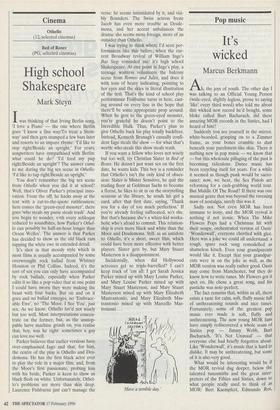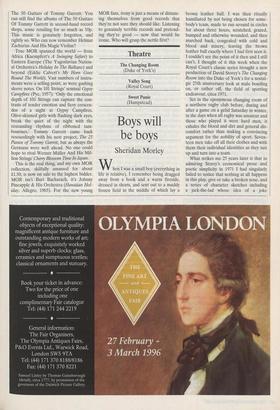Pop music
It's wicked
Marcus Berkmann
Ah, the joys of youth. The other day I was talking to an Official Young Person (wide-eyed, slightly legless, prone to saying 'like' every third word) who told me about this wicked new record he'd bought, some bloke called Burt Bacharach, did these amazing MOR records in the Sixties, had I heard of him?
Suddenly you see yourself in the mirror, white-bearded, grasping on to a Zimmer frame, as your bones crumble to dust beneath your parchment-like skin. There is nothing new in pop music — we know that — but this wholesale pillaging of the past is becoming ridiculous. Dance music has been recycling itself for years. For a while it seemed as though punk would be sacro- sanct: now, we hear, the Sex Pistols are reforming for a cash-grabbing world tour. But Middle Of The Road? If there was one musical genre that was beyond the ravening maw of nostalgia, surely this was it.
Sadly not. Not even MOR has been immune to irony, and the MOR revival is nothing if not ironic. When The Mike Flowers Pops had a Christmas hit with their soupy, orchestrated version of Oasis' Wonderwall', everyone chortled with glee. Here was a joke we could all understand: a tough, spare rock song remodelled as shameless kitsch. Even your grandparents would like it. Except that your grandpar- ents were in on the joke as well, as the MOR version was really rather good. Oasis may come from Manchester, but they do know how to write tunes. Mr Flowers got it spot on. He chose a great song, and his pastiche was note-perfect.
The fact remains that, within us all, there exists a taste for calm, soft, fluffy music full of unthreatening sounds and nice tunes. Fortunately, some of the greatest pop music ever made is soft, fluffy and unthreatening. The new young MOR fans have simply rediscovered a whole seam of Sixties pop — Jimmy Webb, Burt Bacharach, 'It's Not Unusual' — that everyone else had briefly forgotten about. Like Wonderwall', it's music that is hard to dislike. It may be unthreatening, but some of it is also very good. What would be interesting would be if the MOR revival dug deeper, below the talented tunesmiths and the great inter- preters of the Fifties and Sixties, down to what people really used to think of as MOR: Bert Kaempfert, Edmundo Ros, The 50 Guitars of Tommy Garrett. You can still find the albums of The 50 Guitars Of Tommy Garrett in second-hand record shops, some retailing for as much as 10p. This music is genuinely forgotten, and rightly so. Who can now remember Helmut Zacharias And His Magic Violins?
True MOR spanned the world — from Africa (Kaempfert's A Swinging Safari) to Eastern Europe (The Yugoslavian Nation- al Orchestra's Holiday In The Balkans) and beyond (Eddie Calvert's My Horn Goes Round The World). Vast numbers of instru- ments were a selling point, as were gushing sleeve notes. On 101 Strings' seminal Gypsy Campfires (Pye, 1957): 'Only the emotional depth of 101 Strings can capture the con- trasts of tender emotion and fiery crescen- dos of a night at Gypsy Campfires. Olive-skinned girls with flashing dark eyes, break the quiet of the night with the resounding rhythms of ribboned tam- bourines.' Tommy Garrett came back resoundingly with his next project, The 25 Pianos of Tommy Garrett, but as always the Germans were well ahead. No one could hope to rival Werner Muller And His Mil- lion Strings' Cherry Blossom Time In Japan.
This is the real thing, and my own MOR collection, skilfully amassed for about £1.50, is now on sale to the highest bidder. MOR isn't Burt Bacharach, it's Johnny Pineapple & His Orchestra (Hawaiian Hol- iday, Allegro, 1965). For the new young MOR fans, irony is just a means of distanc- ing themselves from good records that they're not sure they should like. Listening to genuinely terrible records and pretend- ing they're good — now that would be ironic. Who will grasp the nettle first?



























































 Previous page
Previous page